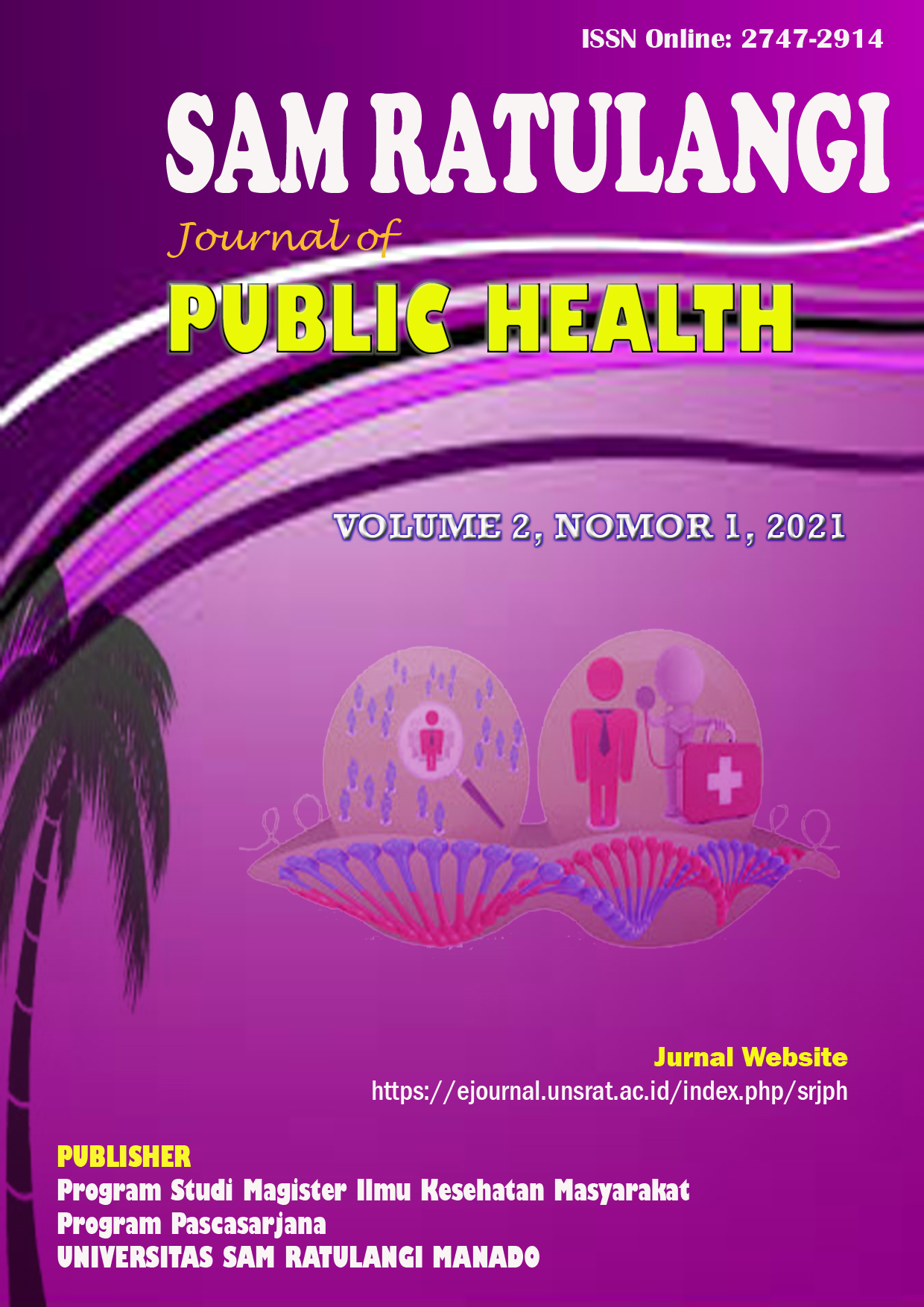Faktor-Faktor Yang Berhubungan Dengan Pemberian ASI Eksklusif
DOI:
https://doi.org/10.35801/srjoph.v2i1.33052Keywords:
exclusive breastfeeding, Teling community health centerAbstract
Background: Breastfeeding without other food can meet the growing needs of a baby up to six months of age. The achievement of exclusive breastfeeding in Indonesia has not satisfactory. The purpose of this study was to determine the factors correlated with exclusive breastfeeding. Methode: This research is a quantitative study using an analytical survey method and a cross sectional approach from November 2018 to March 2019 in the Teling Atas Community Health Center in Manado, involving 140 mothers as a sample. The research variables were measured using a questionnaire and then analyzed using chi square and multiple regression test. Result: This study showed that there was a significant relationship between maternal occupation (p 0,006) and exclusive breastfeeding, while maternal education, maternal knowledge, family support and motivation of health workers had no significant relationship with exclusive breastfeeding (p>0,05). The results of multivariate analysis showed that maternal knowledge greatly influenced exclusive breastfeeding (p 0.04 and OR 2.531). Conclusion: The conclusion of this study is that the maternal occupational factors had a significant correlation with exclusive breastfeeding. However, the community health center should be more active in motivating pregnant and breastfeeding mother about the benefits and methods of exclusive breastfeeding.References
Abdullah, G. dan D. Ayubi. 2013. Determinan Perilaku Pemberian Air Susu Ibu Eksklusif Pada Ibu Pekerja. Jurnal Kesehatan Masyarakat Nasional Vol. 7, No. 7 Hal. 298 – 303.
Dinkes Kota Manado. 2017. Profil Dinas Kesehatan Kota Manado 2017. Manado.
Infodatin. 2017. Mari Dukung Menyusui Dan Bekerja. Pusat Data Dan Informasi Kementerian Kesehatan. Jakarta. www.depkes.go.id
Kemenkes RI. 2012. Peraturan Pemerintah Nomor 33. Pemberian Air Susu Ibu Eksklusif. Jakarta. www.gizi.depkes.go.id
Kemenkes RI. 2018. Buku Saku Pemantauan Status Gizi Tahun 2017. Jakarta. www.kesmas.kemkes.go.id.
Mabud, N. H., J. Mandang dan T. Mamuaya. 2014. Hubungan Pengetahuan, Pendidikan, Paritas dengan Pemberian ASI Eksklusif di Puskesmas Bahu Kecamatan Malalayang Kota manado. Jurnal Ilmiah Bidan Volume 2 Halaman 51 – 56.
Rahmawati, A., B. Bahar dan A. Salam. 2013. Hubungan Antara Karakteristik Ibu, Peran Petugas Kesehatan dan Dukungan Keluarga dengan Pemberian ASI Eksklusif di Wilayah Kerja Puskesmas Bonto Cani Kabupaten Bone. Jurnal Kesehatan, Vol. 2 :31-39
Ramli, R. 2018. Hubungan Pengetahuan dan Status Pekerjaan Ibu dengan Pemberian ASI Eksklusif di Kelurahan Sidotopo. Jurnal Promkes: The Indonesian Journal of Health Promotion and Health Education, Vol. 8 No. 1 Hal. 36 – 46.
Septiani, H., Artha B. dan Karbito. 2017. Faktor-Faktor Yang Berhubungan Dengan Pemberian ASI Eksklusif Oleh Ibu Menyusui Yang Bekerja Sebagai Tenaga Kesehatan. Aisyah : Jurnal Ilmu Kesehatan 2 (2) 2017. Hal 159 – 174.
Sudargo, T., T. Aristasari dan A. Afifah. 2018. 1.000 Hari Pertama Kehidupan.Cetakan I. Gadjah Mada University Press. Yogyakarta. 221 Hal.
Widdefrita dan Mohanis. 2013. Peran Petugas Kesehatan Dan Status Pekerjaan Ibu Dengan Pemberian ASI Eksklusif. Jurnal Kesehatan Masyarakat, Vol. 8, No. 1, Hal 40-45.
WHO. 2018. World Breasfeeding Week 2018. www.who.int/news-room/events/2018.
Timporok, A. G. A., P. M. Wowor dan S. Rompas. 2018. Hubungan Status Pekerjaan Ibu Dengan Pemberian ASI Eksklusif Di Wilayah Kerja Puskesmas Kawangkoan. e-Journal Keperawatan (eKp) Vol. 6 No. 1, Hal 1-6.
Tulangow, C. V., D. V. Doda dan J. A. M. Rattu. 2019. Hubungan Antara Beban Kerja, Stres Kerja Dan Dukungan Keluarga Dengan Pemberian ASI Eksklusif Oleh Ibu Pekerja Di Wilayah Kerja Puskesmas Sagerat Kecamatan Matuari Kota Bitung. Paradigma Sehat, Vol. 7 No. 1, Hal 62–69.

